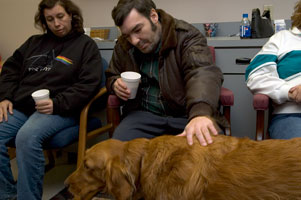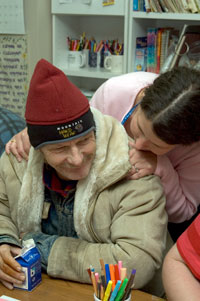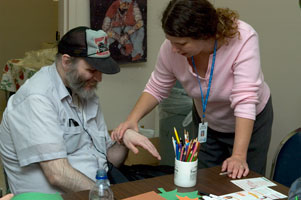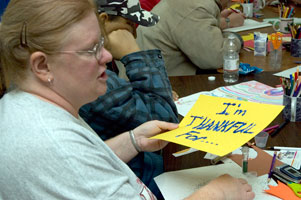|
January/February 2007 Issue Partial Hospitals Restore Hospitality to Patient Care
In the 1950s, hospital stays were measured in months and possibly years. With the advent of better medications for the treatment of schizophrenia, the length of stay was dramatically reduced. According to the American Medical Association, the average length of a hospital stay was 12 days for a mental illness in 1994. Today, hospital stays are frequently much shorter; some hospitals report three- to five-day stays. While psychiatric staff used to worry about the institutionalization of patients, they now worry about not having enough time for psychotherapy and other psychosocial interventions. Pick up any introductory text book on psychopathology, such as Butcher, Mineka, and Hooley’s Abnormal Psychology (2007), and you will find ample evidence that medication plus psychotherapy is more effective in the treatment of mental illness than medication alone for most conditions. Yet where do you find the time for such treatment? Partial hospital programs are hospitable to therapy and psychosocial treatment.
O’Hare Pratt describes how the treatment was constantly focused on the client’s leaving in one or two weeks, and clinicians would have to provide cursory education on symptom management; therapy was something to be done later because there was no time for it in the brief program. Treat the symptoms, help get people feeling better, and discharge them. With the partial hospital program and outpatient care program at the day hospital, patients have a continuum of care from a crisis state or just being discharged from the hospital to those who just need a little extra help. Patients in partial hospital programs (PHPs) live at home but are shuttled to the program from 9 am to 2 pm, five days per week. The focus of those in the PHP is on managing symptoms and coping skills. The goal is to get patients running their lives, not having the symptoms run them. Outpatient care allows patients to come to the Chestnut Ridge Day Hospital on a flexible schedule, ranging from one day every other week to three times per week. Under these circumstances, the hospital is once again accommodating lifestyle changes and creating an environment where long-term therapy can occur.
April Starsick, MSW, LGSW, notes, “The benefit of having the long-term care, especially with chronic mental illness, is that you are not just treating their acute symptoms and then sending them on their way or to a lower level of service that might not be appropriate for the client.” Much of the therapy is done in groups and augmented with brief individual therapy sessions when needed, according to O’Hare Pratt. The group helps each other break through their isolation, build friendships and start caring for each other, and it gets them out of bed in the morning. “If I had to estimate, about 60% of the people live alone. Isolation is a big factor in depression, anxiety, and thought disorders.” O’Hare Pratt recalls Samantha.* “When she came here, we debated as a team whether we could work with her. She was using drugs every time we turned around; either she was not using her medication, or she was abusing it. She was hallucinating, paranoid, and agitated. All of us came from a brief hospital treatment background of getting people out quickly. At the same time, we were saying this is what mental illness is all about, and we are in it for the long haul. It was really a complete change in our thinking. We stuck with her and set firm limits. You cannot abuse your medications. We asked Samantha to bring in all of her medications because she would not take them properly. Time went on, we worked with her patiently, she had little setbacks. She got better and stopped abusing her medications. Actually, she became one of the most pleasant patients. Now she is grateful for having the program and just being able to talk and share. We learned a lot from her,” says O’Hare Pratt.
If the “task of adults is to think through what they have learned as children,” as Virginia Satir suggests, then partial hospitals and outpatient care offer a fertile environment for doing so. * Patient names and identifying information has been changed to protect anonymity. — Neal A. Newfield, PhD, ACSW, is an associate professor of social work and a documentary photographer with the division of social work at West Virginia University. |

 The words hospitality and hospital are rooted in the Latin term hospitalis, meaning “of a guest.” Psychiatric hospitals, ideally, are guest houses for those with mental illness. Hospitals should be a place where people receive generous and cordial care. The pressure of managed care, however, has resulted in shortened stays and a rush to assess and medicate, with little time to address complex psychosocial treatment.
The words hospitality and hospital are rooted in the Latin term hospitalis, meaning “of a guest.” Psychiatric hospitals, ideally, are guest houses for those with mental illness. Hospitals should be a place where people receive generous and cordial care. The pressure of managed care, however, has resulted in shortened stays and a rush to assess and medicate, with little time to address complex psychosocial treatment. Sheila O’Hare Pratt, MSW, LICSW, lead clinician of the Chestnut Ridge Day Hospital, used to work in the short-term adult program offered by the hospital but was frustrated by the limitations. “They would come for awhile and feel a little better. They would go to their individual therapist and physician for the management of their medications and in a brief amount of time, they would be back in the hospital. They were off their medications, or they were not leaving the house. Symptoms came back—hallucinations, paranoia; they would isolate themselves more and more and not make appointments. Then they would come back to the hospital, and the cycle would continue,” she explains.
Sheila O’Hare Pratt, MSW, LICSW, lead clinician of the Chestnut Ridge Day Hospital, used to work in the short-term adult program offered by the hospital but was frustrated by the limitations. “They would come for awhile and feel a little better. They would go to their individual therapist and physician for the management of their medications and in a brief amount of time, they would be back in the hospital. They were off their medications, or they were not leaving the house. Symptoms came back—hallucinations, paranoia; they would isolate themselves more and more and not make appointments. Then they would come back to the hospital, and the cycle would continue,” she explains. “We talk about symptoms, but it is more about what the other things [are] that I need to do in my life. Looking for a new place to live, doing volunteer work, it is a lot slower paced dealing with lifestyle changes,” says O’Hare-Pratt.
“We talk about symptoms, but it is more about what the other things [are] that I need to do in my life. Looking for a new place to live, doing volunteer work, it is a lot slower paced dealing with lifestyle changes,” says O’Hare-Pratt.  According to Dennis Lynch, MA, LSW, the program re-creates a family environment. “It re-creates a sense of family,” he says. “There are many times I feel we are providing a sense of nurturing and emotional support for a group of people who have either never received emotional support or received it for brief periods of time. Their response is they pass it on to each other. Seeing them pass it on to each other has been uplifting.”
According to Dennis Lynch, MA, LSW, the program re-creates a family environment. “It re-creates a sense of family,” he says. “There are many times I feel we are providing a sense of nurturing and emotional support for a group of people who have either never received emotional support or received it for brief periods of time. Their response is they pass it on to each other. Seeing them pass it on to each other has been uplifting.”